GOMER.
Poghell (No. 12. p. 186.).—In Cornwall and Devon there are places called Poughill or Poghill,—in Domesday, Pochelle; and in the Taxatio Ecclesiastica, Pockehulle and Pogheheulle. The etymology of the word, I take to be merely the addition (as is often found) of the Anglo-Saxon hill, or hull, to the old Teutonic word Pock, or Pok, an eruption or protrusion. In low Latin, Pogetum is colliculus. (See Ducange.)
S.S.S.
Swingeing Tureen (No. 19. p. 211., and No. 21. p. 340.).—How could “SELEUCUS” “conclude” that Goldsmith’s “Poor Beau Tibbs and Kitty his Wife,” should have had “a silver tureen” of expensive construction? It is evident that “Kitty’s” husband, in the “Haunch of Venison,” was the Beau Tibbs of the “Citizen of the World.” There can be no doubt that, however the word be spelled, {407} the meaning is swingeing, “huge, great,” which I admit was generally, if not always, in those days spelled swinging, as in Johnson—“Swinging, from swinge, huge, great;” but which ought to be, as it is pronounced, swingeing.
Tureen (pp. 246. 307. 340.).—“And instead of soup in a China terrene.” (Knox, Essay 57 Works. vol. ii. p. 572.)
S.S.S.
"A” or “An.”—Quem Deus vult perdere.—Allow me to refer your correspondents “PRISCIAN” and “E.S. JACKSON” (of No. 22.), to the Selections from the Gentleman’s Magazine, London, 1814, vol. ii. pp. 333. and 162., for some interesting papers on the subjects of their respective inquiries.
The paper first referred to, at p. 333., is certainly well worth perusal, as the writer, “KUSTER,” has examined the question with considerable care, and proves, by many curious instances, that most of those whom we have been taught to look up to as the greatest authorities in English writing—Dryden, Swift, Pope, Johnson, and others—seem to have had no fixed rule on the subject, but to have used “a” or “an” before the same words with the most reckless inconsistency.
The second paper, at p. 162., gives a more detailed account of the adage, “Quem Deus (potius Jupiter) vult perdere,” &c., than “F.C.B.” (whose object, of course, was rather to compare results than to trace derivations) has supplied in his interesting communication.




